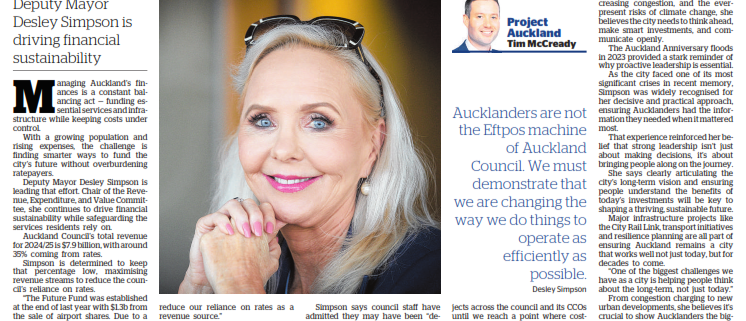Project Auckland: Smarter ways to fund the city's future (NZ Herald)
Project Auckland: Smarter ways to fund the city’s future (NZ Herald)
Managing Auckland’s finances is a constant balancing act — funding essential services and infrastructure while keeping costs under control.
With a growing population and rising expenses, the challenge is finding smarter ways to fund the city’s future without overburdening ratepayers.
Deputy Mayor Desley Simpson is leading that effort. Chair of the Revenue, Expenditure, and Value Committee, she continues to drive financial sustainability while safeguarding the services residents rely on.
Auckland Council’s total revenue for 2024/25 is $7.9 billion, with about 35% coming from rates.
Simpson is determined to keep that percentage low, maximising revenue streams to reduce the council’s reliance on rates.
“The Future Fund was established at the end of last year with $1.3b from the sale of airport shares.
“Due to a higher price and lower fees, we received approximately $31 million more than anticipated,” she says.
“From the next financial year, the Future Fund will return around $68m to council per year. That is $42m more than the original $26m estimated from holding the airport shares.”
Another key source of revenue is Port of Auckland, expected to deliver $1.1b in profits over the next 10 years.
“In 2023/24, the port delivered $42m back to Council, and by 2027, that figure will rise to $110m. This kind of profitability within the group helps reduce our reliance on rates as a revenue source.”
Over this financial year, Auckland Council is working towards $66m in additional savings, having already achieved $43.2m of that, on top of ongoing savings of $90m per year.
Simpson is clear that financial efficiency isn’t just about cutting costs but about ensuring that every dollar is spent wisely and delivers value for ratepayers.
“We also need to prove to Aucklanders that we can manage the delivery of projects well and deliver value for money. Sadly, that’s not always been the case.”
Simpson says council staff have admitted they may have been “desensitised to costs” in the past.
To address this, the council has launched the Better Value Projects programme, aimed at improving how capital projects are procured and executed.
“We have started by analysing three projects: the Milford Beach steps, Jubilee Bridge, and the Meola Rd upgrade,” explains Simpson.
“In each case, staff acknowledged that the projects could (and should) have been delivered better.
“This is just the beginning. Every meeting will continue to analyse projects across the council and its CCOs until we reach a point where cost-consciousness and efficiency are embedded across all departments.
“Aucklanders are not the Eftpos machine of Auckland Council. We must demonstrate that we are changing the way we do things to operate as efficiently as possible.”
Leadership and clear communication
Simpson’s focus on financial sustainability is about more than just balancing the books; it’s about ensuring Auckland is prepared for the challenges ahead.
With a growing population, increasing congestion, and the ever-present risks of climate change, she believes the city needs to think ahead, make smart investments, and communicate openly.
The Auckland Anniversary floods in 2023 provided a stark reminder of why proactive leadership is essential.
As the city faced one of its most significant crises in recent memory, Simpson was widely recognised for her decisive and practical approach, ensuring Aucklanders had the information they needed when it mattered most.
That experience reinforced her belief that strong leadership isn’t just about making decisions, it’s about bringing people along on the journey.
She says clearly articulating the city’s long-term vision and ensuring people understand the benefits of today’s investments will be key to shaping a thriving, sustainable future.
Major infrastructure projects like the City Rail Link, transport initiatives and resilience planning are all part of ensuring Auckland remains a city that works well not just today, but for decades to come.
“One of the biggest challenges we have as a city is helping people think about the long-term, not just today.”
From congestion charging to new urban developments, she believes it’s crucial to show Aucklanders the bigger picture and that shifting the conversation from short-term inconveniences to future benefits is essential.
“These changes aren’t just about the present.
“They’re about a city that runs more smoothly, is more sustainable, and works better for everyone in the long run,” Simpson says.
“We have a unique opportunity ahead of us,” she says.
“Auckland has a wonderful future as long as we continue to think ahead, plan smart, and take people along on the journey.”



